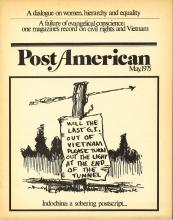The ugly agony of Indochina is made all the more tortuous by the delusive refusal of this nation to accept the culpability for decades of a morally indefensible policy whose final failure is now being revealed.
The urge to believe that we have done what was somehow right and honorable leads us to wash our hands of any sin, and then search to place on others the responsibility for the failure of American policy. So the administration blames the North Vietnamese for violating a treaty that was never initially respected by the South Vietnamese. Other diehard believers in the possibility of America’s cause blame Congress, as if, after spending $150 billion in Indochina, it came up $300 million short of the price of success. Congress, indignant over any suggestion of contributing to the collapse of a government it regularly enjoyed castigating, simply condemns that government once again, saying our efforts have been wasted on incompetents.
All this is so pathetic. Have we now no historical memory?
We have refused to admit that we have been wrong. And look at the suffering that has resulted from that pride.
Let us recall what we all know. A Vietnamese nationalist, who was also a communist, led a struggle against French colonialism and Japanese imperialism. He almost succeeded in 1945. But then the French came back. Since Secretary Acheson faced the vindictiveness of those who believed he had “lost China,” we quickly forgot our anti-colonial rhetoric and looked the other way. The costs domestically and internationally of “losing Vietnam,” as if it ever was ours to lose, propelled us to pay for France’s neo-colonial war, and then disregard the Geneva Agreement. Half of Vietnam could still be kept as proof our policy had not failed.
Read the Full Article

